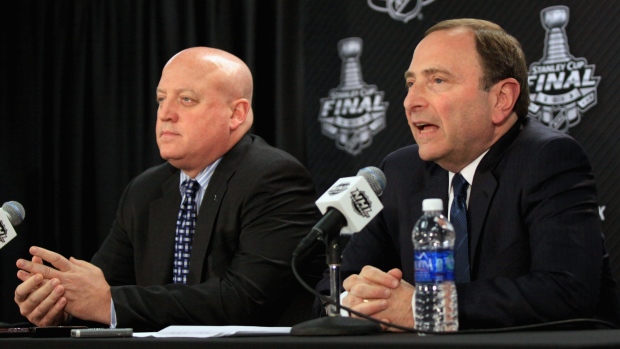Jun 3, 2016
After handing over documents in concussion lawsuit, NHL now fights to keep them secret
The latest legal battle in the NHL concussion lawsuit involves 91 confidential documents that lawyers for the league inadvertently handed over in the case, but now want to keep secret.

The latest legal battle in the NHL concussion lawsuit involves 91 confidential documents that lawyers for the league inadvertently handed over in the case, but now want to keep secret.
The documents include correspondence regarding an arena-safety investigation commissioned by the league after a player was seriously injured when he collided with a stanchion during the 2010-11 season. NHL officials said they were worried the player might sue the league.
TSN obtained the June 1 league filing, which is publicly available and includes a synopsis of some of the documents in question.
Other documents the NHL is now trying to claw back and keep secret include 14 documents regarding emails from NHL deputy commissioner Bill Daly.
One such document includes Daly’s legal advice to his NHL colleagues about potential playing rule changes regarding hits to the head. Another is an email sent by Daly to NHL lawyers with respect to issues in labour negotiations with the National Hockey League Players’ Association (NHLPA).
The league is also trying to keep emails from NHL deputy counsel Julie Grand from public view.
In some of Grand’s emails now at issue, she gives legal advice regarding a statement made by NHL officials to U.S. Congress about player injuries and concussions. In other emails, Grand offered legal advice and comments regarding talking points for the media.
“Each of the documents seeks or provides NHL counsel’s advice on legal matters directly affecting the league, including intellectual property and licensing issues, the legal requirements of the NHL’s CBA with the NHLPA, player and spectator safety, ongoing and potential litigation, and the potential legal ramifications of the NHL’s public statements on many of these issues,” the NHL said in a May 20 court filing that was unsealed on June 1.
The battle over the 91 documents comes two months after a U.S. federal court in Minneapolis unsealed a trove of sensitive emails sent between high-ranking NHL executives, including one email exchange in which Daly linked fighting in hockey to concussions, depression, and “personal tragedies.”
The 2011 email chain was among a series of documents that received widespread media coverage after they were unsealed.
More than 100 former players are suing the NHL, charging the league put profits ahead of their long-term health. Lawyers for the NHL have argued lawyers for the former players are using internal NHL documents and emails to try to win public support and lure more players to the litigation.
Now, the NHL is trying to head off the public release of some emails and documents that league lawyers argue include communication that’s privileged because it’s between lawyers and their clients.
The NHL said in its most recent filing that 230 privileged documents were inadvertently produced to the plaintiffs, who requested the court unseal 141 of those documents. The league and plaintiffs were able to reach an agreement on clawing back or redacting 50 of those documents, with 91 remaining at issue.
The court has told the NHL to present its case before June 14 about why those 91 documents should be kept confidential.
Among the documents at issue is a request for legal advice from NHL lawyers regarding a lawsuit filed by the estate of a former player involving concussion-related allegations.
The documents do not identify the deceased player, although the family of former NHL enforcer Derek Boogaard, who died in May 2011, has been in litigation with the NHL for several years, alleging the league enabled his addiction to painkillers.
It’s uncertain which NHL player is referred to regarding the 2011 stanchion-related injury.
The NHL said in its court filing it hired an outside consultant in anticipation of a grievance or lawsuit stemming from the injury.
“It was essential that the NHL’s counsel - both in-house and outside - be able to engage in frank discussion of facts with Dr. [David] Gushue regarding his arena-safety investigation in order to advise the league about its options and the potential legal ramifications thereof,” the league’s lawyers wrote in the May 20 court filing.
While the NHL does not say who that player was, Montreal Canadiens forward Max Pacioretty suffered a concussion and a fractured vertebra as a result of a check by Boston Bruins defenceman Zdeno Chara in March 2011.
Pacioretty told TSN at the time that he thought Chara was intentionally trying to run him into the stanchion. Chara received a game misconduct for the incident but he was not fined or suspended.
Lawyers for the former players argue that the documents should be unsealed.
"Plaintiffs argue communications that involve advice pertaining to primary elements of the NHL’s business are not legal in nature," the NHL's lawyers wrote in its filing.
Lawyers for the former players also argue the NHL has waived privilege in some instances because documents have been shared with doctors who work for the NHL as consultants.

